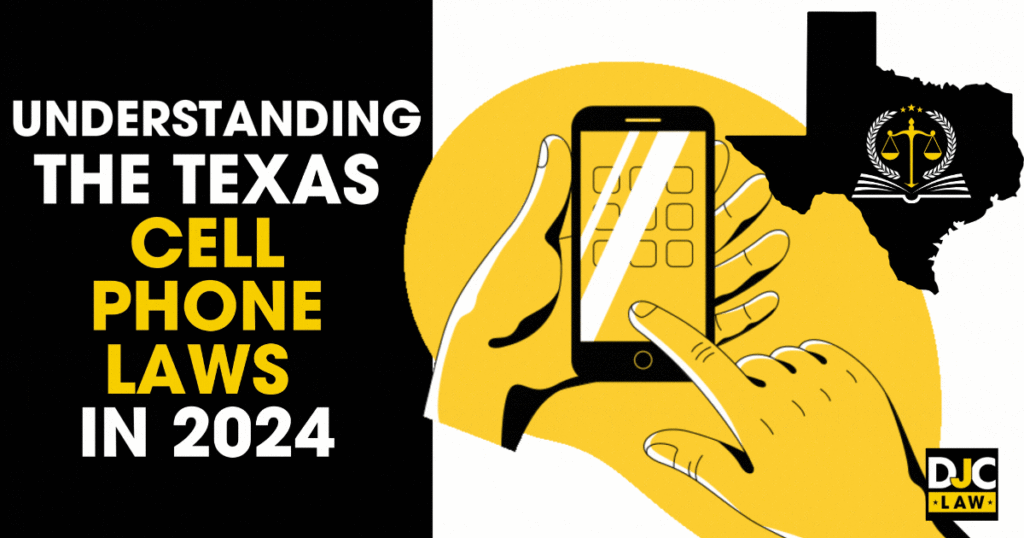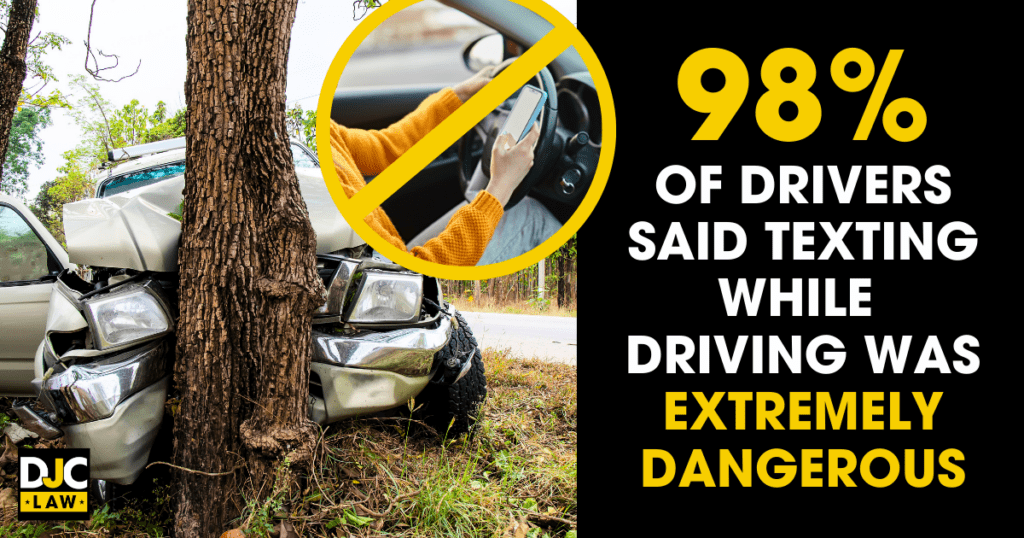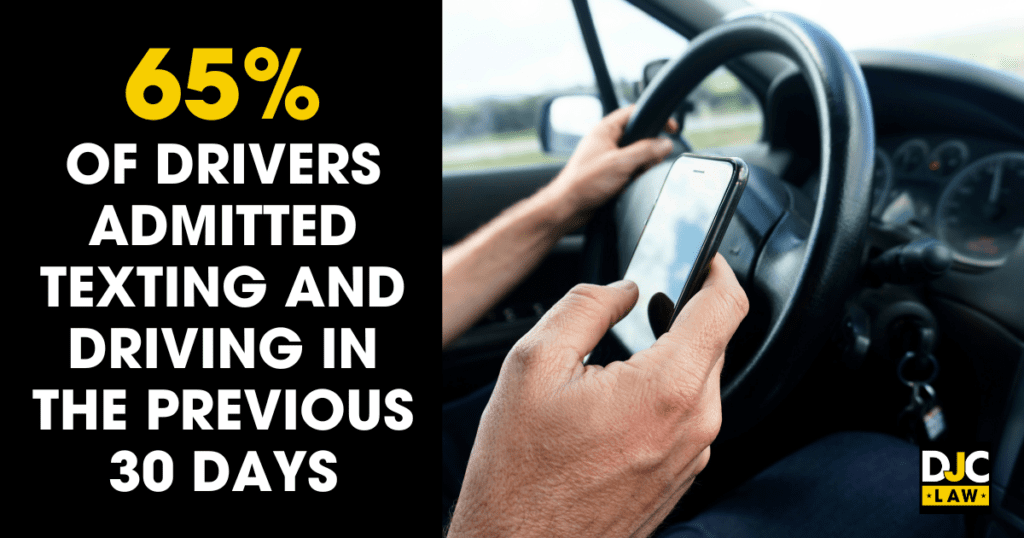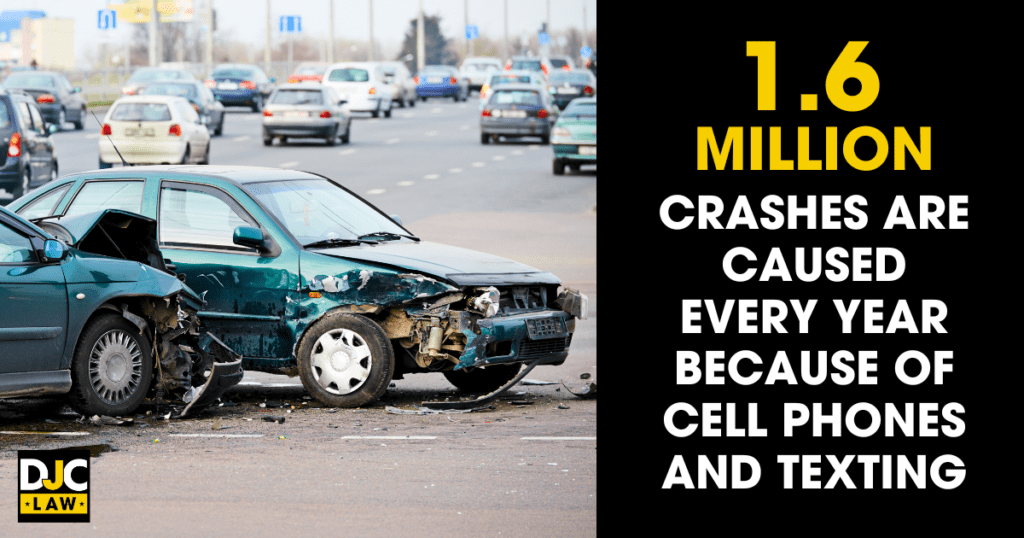
Driving with a cell phone clamped to your ear is extremely dangerous and increases your chances of being involved in an accident. Texas prohibits holding a cell phone for communication while you’re behind the wheel, but the Lone Star State has recently introduced several changes to its cell phone laws.
Unfortunately, cell phone use among drivers is remarkably common, with The Zebra reporting that 7% of all drivers use cell phones at any time. Despite this enormous number, Forbes reported that 93% of drivers said texting and emailing while driving was either very or extremely dangerous.
If you’ve been involved in a car accident and need legal assistance, an experienced Austin car accident lawyer can help protect your rights and navigate the claims process.

Key Takeaways
-
Since 2017, drivers in Texas have been prohibited from using cell phones to text or call while driving unless they’re using hands-free technology.
- For a comprehensive overview of the dangers associated with texting while driving, refer to our detailed Texting and Driving Statistics 2024.
-
New drivers may not use cell phones or hands-free technology for the first six months after receiving their licenses, and drivers under 18 may not use them at all.
-
Exceptions to using a cell phone while driving include if you need to call law enforcement or an ambulance.
-
The consequences of using a cell phone while driving include fines, increased insurance premiums, license suspension/revocation, and even criminal charges.
-
If you’re looking to avoid using your phone while driving, try setting your playlist/GPS before you start your journey, hiding your cell phone, or using a self-locking app.
-
Getting involved in an accident with a distracted driver enables you to claim compensation, with the best way to do this being to hire a lawyer who can comprehensively prove the other driver’s negligence.
2024 Texas Cellphone Laws to Remember
Texas mandates that drivers use Bluetooth technology and hands-free communication if they intend to use devices like smartphones while driving. The latest incarnation of the law also applies to all functions beyond texting and talking, including choosing music or GPS apps.
Activities you can’t perform on a cell phone while driving include:
-
Reading messages
-
Writing messages
-
Sending electronic messages, including SMS and email
-
Using messaging apps
-
Browsing social media
-
Take photos/videos
-
Playing games
-
Watching videos
Texting and driving have been illegal in Texas since 2017, per the Texas Transportation Code Section 545.4251. However, that doesn’t mean cell phones are prohibited entirely. Many Texans use their phones to play music or work out their routes.
Let’s review the main aspects of Texas’s cell phone regulations.
Texting While Driving
You cannot send or read text messages if you’re driving. However, the law allows you to use your phone’s navigation system, such as a map app. Police officers are entitled to pull you over if they believe you’ve been texting.
It’s strongly recommended that you queue up your music and set up your navigation before taking off.
New Drivers
New drivers are banned from using phones for any reason, including for otherwise permitted reasons. The ban lasts for six months from the day you receive your first license. Note that this applies to every new driver, regardless of age.
The idea behind this rule is to help new drivers breed good habits, particularly because younger drivers are likelier to be distracted. According to the U.S. Centers for Disease Control, 9% of drivers between 15-20 were distracted at any one time.
After the initial six-month probationary period, new drivers are given full driving privileges, enabling them to use their cell phones with hands-free technology. Under the hands-free law in Texas, drivers under 18 cannot use cell phones regardless of whether they’ve completed their six-month probation.
It makes sense because Teen Driver Source found that 39% of high school students admitted to texting or emailing while driving during the last month.
School Zones
Handheld devices may not be used in any school zone, including public school property, with reduced speed limits.
On a side note, school bus drivers are prohibited from using even hands-free devices if children are on their bus.
What is Distracted Driving?
Distracted driving means driving while performing any other activity. Four types of distracted driving exist, including visual, auditory, manual, and cognitive. Any type of distracted driving increases your risk of an accident by slowing your reaction times and preventing you from perceiving hazards.
Here’s a breakdown of the four types of distracted driving:
-
Visual – Taking your eyes off the road for any reason, such as to look at a passenger or change the radio station.
-
Auditory – Listening to something unrelated to driving, such as excessively loud music.
-
Manual – Taking one or both hands off the wheel, like if you’re eating while driving or fiddling with your map app.
-
Cognitive – Thinking about something other than driving. For example, you might be daydreaming.
Many of the most common forms of distracted driving might cover more than one of these categories. For example, texting while driving means having a visual, manual, and cognitive distraction. Likewise, if you’re taking a call while driving, you’ve got an auditory, manual, and cognitive distraction.
According to the AAA, it was estimated that around 10% of all fatal crashes involved distracted drivers. But you might ask, isn’t using hands-free technology also a legal form of distracted driving? The answer would be yes because your eyes and hands might be in the right place, but you’re listening to and thinking about something other than driving.
Is it Illegal to Hold a Phone While Driving in Texas?
Holding a phone while driving in Texas is illegal. The state’s original “Hands-Free Law” bans having a cell phone in your hand. It’s one of a handful of states that prohibits holding a cell phone, even if you’re not using it to text or take a call.
Instead, you should pull over somewhere safely to do whatever you need to do on your phone. If you must communicate while driving, ensure that your phone can be controlled using a hands-free piece of technology, such as Bluetooth earbuds.
Is it Illegal to Text and Drive in Texas?
Texting and driving in Texas is illegal, apart from in some rare cases, such as if you’re contacting law enforcement. You may not drive and text or even drive and read any texts you might have received while on the road.
The only way to text and drive legally is by using a hands-free device to write a message using your voice. However, we wouldn’t recommend doing this as it’s still a type of distracted driving.
Despite this, countless drivers continue to break the law. The Texas A&M Transportation Institute found that after the 2017 law took effect, 65% of drivers admitted texting and driving in the previous 30 days.

Is Texas a Hands-Free State?
Texas is one of the many hands-free states. Under Texas law, most drivers are permitted to use hands-free devices when behind the wheel. Any devices must be controlled using Bluetooth, special apps, or voice commands.
The Texas Department of Transportation reveals that even though they are a hands-free state, almost one in six crashes were caused by the negligence of a distracted driver, with 399 deaths and 2,793 serious injuries.
Can You Text at a Red Light in Texas?
Texting at a red light in Texas is still classified as illegal because the law still considers you to be operating a motor vehicle, even if you’re not in motion. The hands-free law still applies whether you’re at a red light or stuck in a traffic jam.
You can only text behind the wheel if you pull off the road and enter a safe location. For example, if you’re sitting in the driver’s seat in a parking lot with the engine switched off, this wouldn’t violate the law.
The National Safety Council reported that 1.6 million crashes are caused every year because of cell phones and texting. Although texting while stopped at a red light might be tempting, this is a prime opportunity for traffic officers to pull you over and give you a ticket.

Exceptions for Hands-Free Law Violations
In rare cases, you can use your cell phone while driving without using hands-free technology. The most common exception is if you are experiencing an emergency and need to contact law enforcement or call an ambulance.
For example, if you’ve been involved in a road rage incident and locked your windows and doors, you can use your cell phone to call law enforcement and take photos or videos of the perpetrator.
Mounted GPS devices can also be used as an exception to the hands-free law. Furthermore, you may use your cell phone if you’re parked.
Consequences of Violating Hands-Free Laws
Violating the Texas Hands-Free Law can lead to many consequences, including a minimum $99 fine, increased insurance rates, license revocation, and criminal charges.
Here’s a breakdown of the consequences you face for getting caught using your cell phone while driving:
-
Fines – Fines are set at $99 for first-time offenders and $200 for all subsequent offenses.
-
Points – You can no longer receive points on your driving license. Texas no longer applies points for moving violations after repealing its Driver Responsibility Program (DRP) in 2019.
-
Insurance Premiums – All moving violations are recorded and come with fines. Your auto insurance firm may choose to raise your premiums if you have too many moving violations on your record.
-
License Suspension – Your license may be suspended for earning too many moving violations. For example, if you have four or more moving violations over a 12-month period or seven over a 24-month period, you’ll receive a ban.
-
Criminal Charges – You can be charged criminally with offenses like reckless and dangerous driving for texting if it’s believed your cell phone use caused an accident resulting in bodily injuries.
How Much is a Cell Phone Ticket in Texas?
Using a cell phone results in a $99 fine for a first-time offense. Subsequent offenses could result in a $200 fine.
However, the cost of the ticket may be relatively cheap, but the true cost comes in the additional consequences. If your license is suspended for too many moving violations, you may have to pay someone else to drive you around. Likewise, your premiums could rise due to texting and driving, costing you hundreds of dollars more annually.
Effective Ways to Avoid Using a Device While Driving
Finding it tough to avoid using your smartphone while driving? Tips include preparing everything you need before beginning your journey, using self-locking apps to avoid the temptation, or even putting your device out of sight. For more strategies to ensure safety, consider these 7 Actionable Tips on Avoiding Accidents on the Road.
Many of us find it a challenge to put our cell phones away. Did you know that KXXX found that American adults spend an average of 11 hours a day in front of screens? If that sounds familiar, here’s how to avoid the screen while in motion:
-
Pick Your Playlist Before Starting – Do you like listening to music while you drive? Pick your driving playlist before hitting the open road.
-
Map Your Route First – Many drivers rely on their GPS systems to get around, especially in an unfamiliar location. Switch on your GPS and plan your route before turning on the ignition.
-
Turn On Silent Mode – Notifications ping all day but can distract you when driving. Avoid notifications entirely by turning on silent mode or setting your phone to flight mode.
-
Hide Your Phone – Some people find that it helps to lock their phones in the glove compartment so they can’t see them. If this doesn’t work, deposit your phone somewhere in the back of the car so you can’t reach it.
-
Use Self-Locking Apps – Free apps can lock your phone for a specific period. Essentially, your phone becomes a brick for however long you don’t want to use your phone for. Time it so that it covers your usual driving times.
Feel free to combine these strategies to avoid cell phone use. It can be tough for many of us to put our phones down when most of us are addicted to these little screens, but it’s an act that could save lives. Additionally, understanding the broader context of road safety, including Seat Belt Statistics, highlights the importance of comprehensive safety practices
What to Do If You Are Involved in a Car Accident Where the Other Driver Was Distracted?
Dealing with distracted driving accidents requires a cool head and knowing the proper steps to take after a traumatic experience. Making phone calls to law enforcement and prioritizing your health are your two priorities if you’ve been hit by a distracted driver.
Follow these steps to manage distracted driving crashes the right way:
-
Check Yourself – The first step is to examine yourself and your passengers for any injuries. Call an ambulance and wait until first responders arrive to assist if someone is seriously injured.
-
Call 911 – Whether you’re injured or not, report your accident to the police. A traffic officer can attend and fill out an official accident report, which is crucial evidence for later as you file a claim.
-
Exchange Details – You’re legally required to exchange insurance details with the other driver. Failing to do so means you’ve committed a hit-and-run violation, which can come with significant penalties.
-
Gather Evidence – The accident scene is your prime opportunity to gather evidence. Use your cell phone to take pictures and videos of everything from visible injuries to vehicular damage. If there were any eyewitnesses, ask them for their contact details. Note that eyewitnesses have the right to refuse.
-
Get to a Medical Facility – Even if you feel completely fine, you still might be hurt. Visit your closest medical facility and tell them what happened. You’ll receive a medical examination, ensuring you have no hidden injuries. Many accident victims don’t feel the effects until hours later.
-
Notify Your Insurer – You’re obliged to report any accident to your insurer, no matter how minor. Most policies require you to report an accident between 24 and 72 hours after the fact.
The final step in handling a distracted driving accident is to contact a personal injury attorney. Let them take control of negotiations, gather evidence, and pursue the maximum amount of compensation while you focus on your recovery.
Proving Distracted Driving in Texas
Proving distracted driving can be difficult because you require firm evidence that someone was breaking the law. If the other driver was distracted, this could win your case because Texas is an at-fault state, meaning it’s the at-fault party that pays all damages.
Here are the steps a car accident attorney will take to prove distracted driving:
-
Phone Records – Your lawyer can obtain a subpoena to obtain the cell phone records of the other driver, which could prove they were texting or talking at the time.
-
Eyewitnesses – If eyewitnesses were present, they might be able to attest to the fact that the driver was using a mobile device. In some cases, attorneys may subpoena witnesses to force them to testify.
-
Police Reports – The official crash report details the attending police officer’s opinion of the incident. If the law enforcement officer cited the other driver for cell phone use, this will be on the report.
-
Camera Footage – Camera footage from traffic surveillance cameras, dashcams, cell phone video, or business security cameras can all prove that the other driver was using their cell phone.
-
Accident Reconstruction – Accident reconstruction analyzes what happened when the collision took place with the help of experts. Proper reconstruction could prove that the other driver wasn’t paying attention to the road.
Proving distracted driving in car accidents always relies on evidence. Without evidence, it’s essentially your word against the other driver’s. By working with a personal injury attorney, you have the legal expertise needed to prove that the other driver was distracted.
Cell Phone Laws in Texas FAQs
Who is allowed to use a cell phone to talk while driving?
Nobody can use a cell phone while driving without using hands-free technology. The only exception to this rule is if you’re involved in an emergency and need to call an ambulance or law enforcement.
Is using cell phones while driving more dangerous than drunk driving?
Using a cell phone to text while driving is about six times more dangerous than driving drunk, according to findings from the National Highway Traffic Safety Administration (NHTSA). It’s all down to reaction times, with people texting likely not looking at the road at all.
Can you go to jail for texting and driving in Texas?
No, you cannot go to jail for texting and driving in Texas. However, if you’re texting and cause a serious accident, you may receive criminal charges, such as reckless and dangerous driving. These charges could land you in jail, especially if your actions led to the death of another person.


